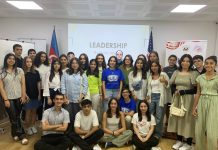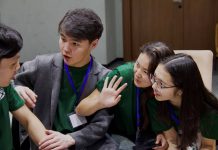Civic activism, community leadership and global network of friends:
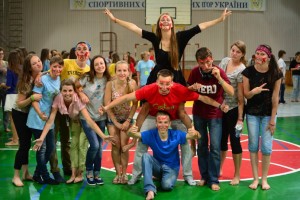 Born from ideas taken from a Peace Corps camp, ‘Community Action Ukrainian Style’, also known as CACTUS, has developed into one of the most successful joint projects ever between Peace Corps volunteers and FLEX alumni. Divided into three stages, the CACTUS program aims to initiate positive change in society through providing youth participants (19 and under) with skills in community leadership, project development, English language, knowledge of world issues and current events.
Born from ideas taken from a Peace Corps camp, ‘Community Action Ukrainian Style’, also known as CACTUS, has developed into one of the most successful joint projects ever between Peace Corps volunteers and FLEX alumni. Divided into three stages, the CACTUS program aims to initiate positive change in society through providing youth participants (19 and under) with skills in community leadership, project development, English language, knowledge of world issues and current events.
‘We show our participants that they don’t need to be foreign to speak English, neither have they to look for opportunities outside of their own country. Throughout the program we look at successes and experience of other countries, break existing stereotypes, and make sure that the participants do not doubt their capacity to make positive change in their communities,’ says CACTUS Director in 2013 and 2014 and Alumni Coordinator for Central Ukraine Lyudmyla Krasnytska ’10. The second program director is also a FLEX alumnus – Roman Vydro ’10, a student at Kharkiv National University and former Alumni Coordinator in Eastern Ukraine. Being integrated into the Peace Corps service, CACTUS initially included four project directors working on the program simultaneously, two Ukrainians and two Americans. After Peace Corp was evacuated from Ukraine in February 2014, the director’s structure was revised with Lyudmyla Krasnytska and Roman Vydro preparing CACTUS on the ground and former Peace Corps volunteers Brendan Cahill and Paul Klein helping remotely.
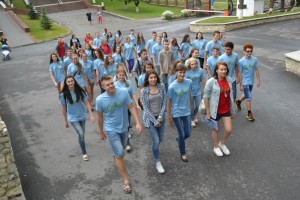 ‘We always knew that at some point CACTUS would become an independent program, but nobody expected that it would happen so quickly. Therefore we called last year a sustainability crash test for CACTUS. In the end, the program survived and I think a big part of it was having a one-year handover period during which the director passes his or her expertise to their successor,’ Roman remarks. Each year the program runs from January till November and is divided into three stages – 1-day Practice CACTUS seminars in spring, 10-day Forum in summer and follow-up projects organized by the CACTUS Forum participants in fall.
‘We always knew that at some point CACTUS would become an independent program, but nobody expected that it would happen so quickly. Therefore we called last year a sustainability crash test for CACTUS. In the end, the program survived and I think a big part of it was having a one-year handover period during which the director passes his or her expertise to their successor,’ Roman remarks. Each year the program runs from January till November and is divided into three stages – 1-day Practice CACTUS seminars in spring, 10-day Forum in summer and follow-up projects organized by the CACTUS Forum participants in fall.
The first stage of CACTUS is the Practice CACTUS seminar series organized by a team of volunteers in different regions of Ukraine. In 2015, a team of 66 volunteer trainers organized 17 Practice CACTUS seminars in 15 Regions of Ukraine for 680 youth. This year the volunteers, many of whom are FLEX alumni or alumni of the CACTUS program, reached regions that were never exposed to similar seminars. During seminars participants are split into teams, take elective classes, learn about global issues and dedicate time to project development. At the end of the day each team prepares and creatively presents public service announcements using the information they learned. ‘One of our goals for this year is to increase the number of Practice CACTUS seminars up to 15-20 because by doing so we will increase the outreach and encourage more school students to apply to the larger camp – the FORUM. We hope that in the future getting into CACTUS will be considered an achievement,’ Roman points out.
10 Busy Forum Days
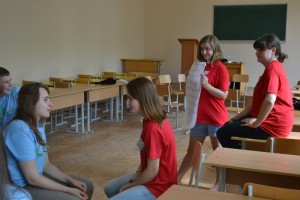 The Forum itself has a program which keeps its 70 participants and 27 staff members on their toes and energized from 8 in the morning until bed time. Their daily schedule consists of 2 elective classes ranging from World Cultures to Music, from Ecology to Photography, 2 sessions of project development, teambuilding time, siesta and evening activities. Community service events are also included and required for all participants. ‘We try to make sure that serious events are followed by fun energetic activities so that participants would never be bored, but still have time to reflect. During Cultural Night, for example, organizers create a so-called live library inviting people representing different minority groups to share their stories and confront stereotypes, and during siesta hours we organize fun elective classes, which we couldn’t fit into the schedule. However, it was quite unexpected for us that many participants actually took part in the electives – we thought that they would prefer to sleep instead,’ Lyudmyla says.
The Forum itself has a program which keeps its 70 participants and 27 staff members on their toes and energized from 8 in the morning until bed time. Their daily schedule consists of 2 elective classes ranging from World Cultures to Music, from Ecology to Photography, 2 sessions of project development, teambuilding time, siesta and evening activities. Community service events are also included and required for all participants. ‘We try to make sure that serious events are followed by fun energetic activities so that participants would never be bored, but still have time to reflect. During Cultural Night, for example, organizers create a so-called live library inviting people representing different minority groups to share their stories and confront stereotypes, and during siesta hours we organize fun elective classes, which we couldn’t fit into the schedule. However, it was quite unexpected for us that many participants actually took part in the electives – we thought that they would prefer to sleep instead,’ Lyudmyla says.
Some participants enjoy the program so much that they decide to return to the camp next summer as pre-selected participants or Counselors in Training (CIT). In this role they train to become future CACTUS staff members. CITs take advanced classes in project development and are responsible for organizing a special social event at the end. It is also during the Forum that many participants learn about the FLEX program and in feeling more confident about their English skills decide apply for the program the following autumn.
‘Two hours of project management per day might sound exhausting, but in reality participants love it and even ask for more time. We try to do it in a different way from the standard Ukrainian educational system by using fun activities and visuals to illustrate the concept. In other words, we figured out how to make boring stuff exciting for teenagers,’ Roman says.
Developing Local Communities
Forum participants under the mentorship of CACTUS staff members have the opportunity to develop follow-up projects. The alumni are entitled to apply for CACTUS mini-grants that help them to implement their projects and this teaches them the process of the proposal writing process.
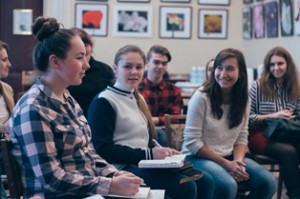 In November 2014 FLEX alumna Anastasiya Karavan ‘14 conducted an inspiring 2-day public speaking seminar in Chernihiv. She participated in the CACTUS Forum shortly after her return from the U.S. and decided to implement a project using her recent experience of competing in the ‘Future Business Leaders of America’ (FBLA) public speaking events where she won school, district, and state contests and was eventually invited to the nationals: ‘I found out that I was invited to the National Public Speaking Leadership Conference right before my return to Ukraine. I couldn’t stay in America until the conference so I flew back from Ukraine for the nationals. My American high-school school and friends raised money to cover all the expenses and even though I didn’t become a finalist, it was the experience of a lifetime. Besides, I was the only international non-native speaker student among all the competitors’.
In November 2014 FLEX alumna Anastasiya Karavan ‘14 conducted an inspiring 2-day public speaking seminar in Chernihiv. She participated in the CACTUS Forum shortly after her return from the U.S. and decided to implement a project using her recent experience of competing in the ‘Future Business Leaders of America’ (FBLA) public speaking events where she won school, district, and state contests and was eventually invited to the nationals: ‘I found out that I was invited to the National Public Speaking Leadership Conference right before my return to Ukraine. I couldn’t stay in America until the conference so I flew back from Ukraine for the nationals. My American high-school school and friends raised money to cover all the expenses and even though I didn’t become a finalist, it was the experience of a lifetime. Besides, I was the only international non-native speaker student among all the competitors’.
Anastasiya thought that organizing a similar competition in her native Chernihiv could motivate young people to become more proactive and develop their speaking skills. Together with other 4 FLEX alumni, she negotiated a free venue within a public library, invited professional guest speakers, and advertised the event in local schools. The event took place on November 15-16, 2014 for 22 participants. All involved gained valuable knowledge about public speaking techniques and the use of non-verbal communication. The participants give impromptu speeches on a variety of topics, an experience which helped many of the high-school and university students to feel more confident during school presentations and in their daily life.
Following the success of the public speaking series, Anastasiya joined forces with her parents to bring an autism care center in Ukraine and are now in the process of registering their NGO and searching for funding. The team has already established links with the American autism treatment center Son-Rise as well as with local art therapists, psychologists and doctors who are willing to get involved.
Some CACTUS alumni projects have been operating for a number of years and in that period have built strong bonds in the community. Give Child Hope is a project started by Iryna Rydno, CACUS forum from 2012, which aims to connect students of the Zalishchyky Gymnasia with the town orphanage. Each month the Gymnasia high school students prepare activities for the orphanage and mentor incoming high school students to take over the initiative.
Among other interesting projects implemented over the years are the Cherkasy Social Media group called Youth Opportunities in which information about scholarships, internships and jobs available in the area is posted daily, and the project Paint Happiness in Rivne where the participants painted colorful pictures on the walls of a local orphanage playground turning it into a fairy-tale land.
Finding sufficient funds to run all three stages of CACTUS each year is a challenge. Last year FLEX Alumni and U.S. Embassy grants covered 29 percent of the Forum’s total costs with the remaining 70 percent being mostly in-kind donations, such as equipment, discounts, volunteer work, and corporation benefits. In 2014 The CACTUS Alumni Association set up a special alumni fund with the objective to raise ¼ of the Forum’s budget. The Forum’s participants have to pay a small fee of approximately 50 dollars, which covers their full lodging and accommodation for 10 days and is considerably cheaper than other Ukrainian summer camps. This strategy is important because it allows children from underprivileged families and rural areas to participate as well.
Despite all of the obstacles, both Roman and Lyuda feel that the future for the program is bright. They hope that CACTUS will continue growing and expanding the network of young empowered activists with a global scope in all regions of Ukraine. ‘If you are looking for an international environment and civic activism in Ukraine, you should definitely try CACTUS,’ Roman says.
For more information about CACTUS, go to http://www.cactu![]() sua.org/
sua.org/
Article written by Tatyana Movshevich



